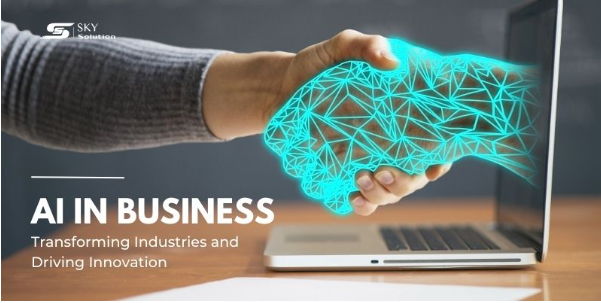Artificial intelligence (AI) is no longer a futuristic concept; it has become an integral part of today’s business landscape. By streamlining operations, enhancing decision-making, and improving customer experiences, AI is reshaping industries across the globe. In this post, we explore the transformative applications of AI in business showing how businesses can leverage this technology to gain a competitive edge.
1.What is AI in Business?
AI refers to technologies that empower machines to analyze data, comprehend language, make decisions, and solve problems – capabilities traditionally associated with human intelligence.
AI in business plays a dual role: replacing humans in repetitive tasks while assisting them in complex processes for improved efficiency. Once properly trained, AI surpasses humans in speed and accuracy when processing vast datasets, be it for customer insights, market trends, or internal operations.
2.Key Applications of AI in Business
As the technology evolves, businesses are moving beyond automation to deploy AI in strategic initiatives that deliver lasting value and competitive advantages. Let’s have a look at how AI is reshaping every aspect of businesses.
AI in Customer Service
AI has revolutionized customer service by making interactions faster and more personalized. Chatbots powered by natural language processing are now a staple in customer support. These AI-driven assistants provide 24/7 service, offering instant, human-like responses tailored to individual customer needs. By analyzing customer interactions and preferences, chatbots deliver solutions that feel personal and relevant.
AI also powers recommendation systems, enhancing shopping experiences. By analyzing purchase history and browsing behavior, AI suggests products aligned with customer interests, boosting engagement and driving sales.

AI in Customer Relationship Management (CRM)
Managing customer relationships can be overwhelming, especially as businesses scale. AI-powered CRM systems simplify this process by centralizing customer data and automating repetitive tasks like data entry and lead qualification. This ensures your team can focus on complex tasks while maintaining seamless omnichannel support.
Moreover, AI-enhanced CRMs are scalable, adapting effortlessly to growing datasets without compromising performance. Businesses leveraging AI in business for CRM enjoy streamlined operations and improved customer satisfaction.
AI in Marketing and Sales
AI is a game-changer in marketing and sales, enabling businesses to execute campaigns with precision. For instance, AI excels in customer segmentation, analyzing massive datasets to group customers accurately and quickly. This helps businesses tailor messages for specific audience segments, increasing engagement.
Predictive analytics powered by AI supports demand forecasting by analyzing past trends and real-time inputs. This helps businesses plan inventory, optimize pricing strategies, and prepare for market fluctuations. Dynamic pricing, another AI-powered tool, adjusts prices in real-time based on demand, competitor pricing, and stock levels.
AI in Supply Chain Management
Modern supply chains are complex and expansive, but AI in business simplifies their management. AI predicts customer demand, optimizing inventory levels to prevent overstocking or shortages. Computer vision systems assist in quality control, detecting defects early and ensuring high standards.
In logistics, AI analyzes traffic patterns, weather conditions, and delivery schedules to optimize routes and improve shipment reliability. These innovations reduce costs, improve efficiency, and enhance customer satisfaction.

AI in Human Resources (HR)
AI transforms HR processes, from recruitment to employee engagement. Generative AI tools, like ChatGPT, help HR teams draft job descriptions and internal communications quickly. AI also speeds up resume screening, matching candidates to roles with greater accuracy.
For employee management, AI offers performance insights, identifies skill gaps, and streamlines onboarding processes. Automating repetitive tasks allows HR professionals to focus on strategic initiatives and foster a positive workplace culture.
AI in IT Operations (AIOps)
IT operations are increasingly benefiting from AI. AIOps automates repetitive tasks, prioritizes critical issues, and proactively addresses risks before they escalate. By analyzing anomalies, AI enhances performance monitoring and identifies root causes of problems faster than traditional methods.
AIOps also fosters collaboration by centralizing operational data and providing actionable insights to different teams. This enables seamless communication and reduces downtime, further proving the value of AI in business operations.
AI in Security
AI is a vital tool in both physical and cybersecurity. In physical security, AI-powered surveillance systems provide continuous monitoring, using facial recognition to ensure facility safety. These systems detect unusual activity in real-time, enabling swift responses to potential breaches.
In cybersecurity, AI in business helps detect threats, predict vulnerabilities, and prevent attacks before they occur. By analyzing patterns in vast datasets, AI identifies malicious activities and applies automated responses, such as blocking unauthorized access or isolating affected systems, ensuring robust digital protection.

AI in Accounting
AI simplifies accounting by automating labor-intensive tasks like invoice processing and reconciliation. By extracting and organizing data from large volumes of documents, AI reduces errors and allows accountants to focus on strategic analysis.
Fraud detection is another area where AI in business shines, analyzing financial data to flag irregularities early. Additionally, AI supports accurate budgeting and forecasting by analyzing historical and real-time financial data, helping businesses make informed decisions.
3.Choosing your partner for AI Integration
Incorporating AI in business is a transformative journey, and having the right partner can make all the difference. The complexities of AI demand more than just technological tools; they require expertise, customization, and a deep understanding of your business needs. This is where a partner like Sky Solution stands out.
Sky Solution has earned recognition for its ability to craft AI-driven strategies that align seamlessly with business goals. Their approach focuses on creating solutions that not only enhance operational efficiency but also position businesses for long-term success. With Sky Solution, businesses gain access to cutting-edge technology and insights tailored to their unique challenges.
